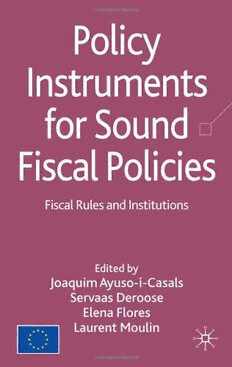
Policy Instruments for Sound Fiscal Policies: Fiscal Rules and Institutions (Finance and Capital Markets) PDF
373 Pages·2009·2.612 MB·English
Most books are stored in the elastic cloud where traffic is expensive. For this reason, we have a limit on daily download.
Preview Policy Instruments for Sound Fiscal Policies: Fiscal Rules and Institutions (Finance and Capital Markets)
Description:
Economic literature has extensively analysed how taxes, government spending and budget balances should be set over the cycle in order to ensure the conduct of an appropriate fiscal policy. However, experience has shown that governments do not always pursue sound and sustainable policies. Rather, they have a tendency to implement pro-cyclical policies, in both good and bad times, while debt ratios have increased in many countries over the past few decades due to protracted budgetary deficits. The causes of this deficit bias and the tendency to conduct pro-cyclical budgetary policies are related to the common pool problem, policy makers` short-term approach, and voters` fiscal illusion. These elements can lead to an inappropriate use of discretionary decision making and time-inconsistent fiscal policies, which is particularly worrisome in the context of EMU due to their potentially adverse spillover effects. Policy makers and academics generally agree that the institutional setting of a country critically determines the quality of economic policy making. In particular, the elements that form domestic fiscal frameworks, namely fiscal rules and institutions and budgetary procedures, are key factors influencing the conduct of budgetary policy and limiting the emergence of a deficit bias and the implementation of pro-cyclical fiscal policies. This book focuses on two of these elements: numerical budgetary rules and independent fiscal institutions. The role of these institutional arrangements in shaping budgetary outcomes as well as some specific country experiences are analyzed and assessed throughout this volume, leading to conclusions on the instrumental character of these devices in promoting sound and sustainable fiscal policy.
See more
The list of books you might like
Most books are stored in the elastic cloud where traffic is expensive. For this reason, we have a limit on daily download.
